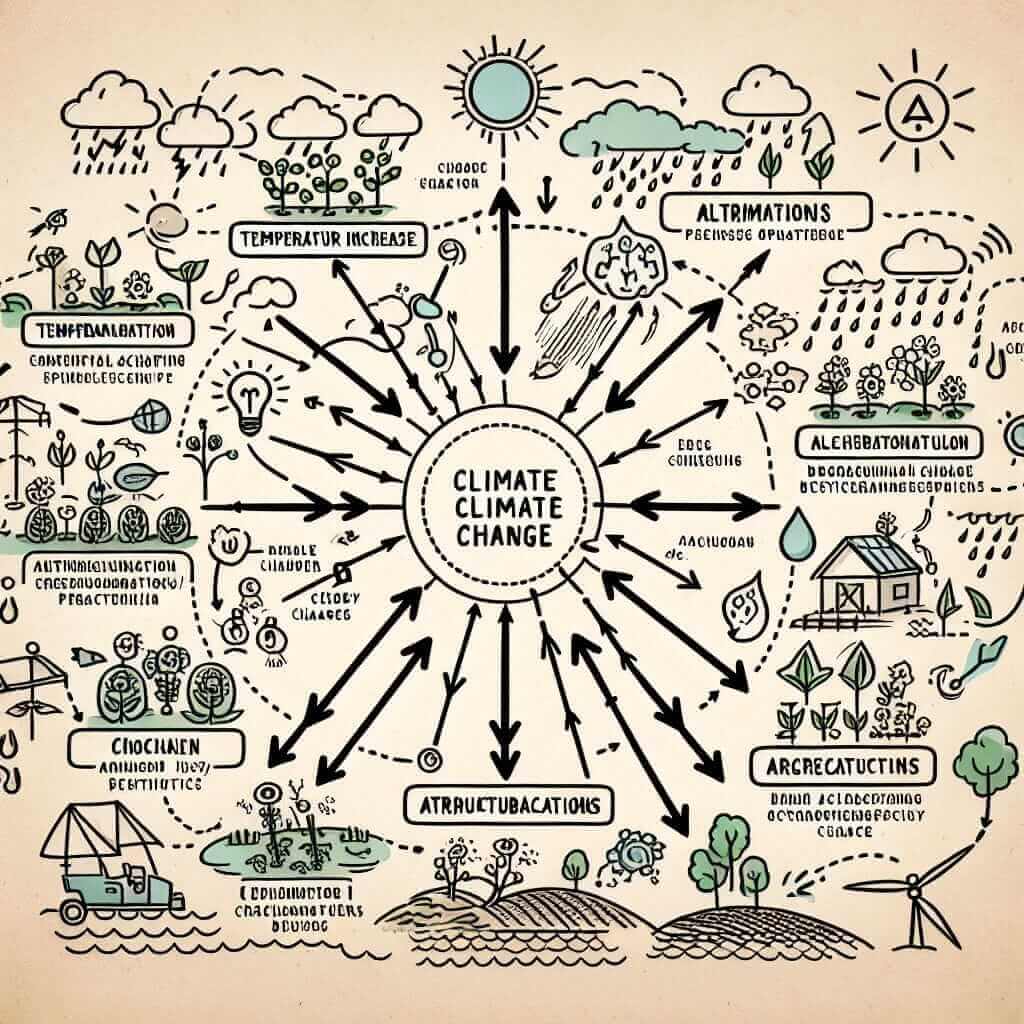The IELTS Reading section often includes topics reflecting current global issues. One such pressing issue is the impact of climate change on agricultural practices. This topic has appeared in the past and is likely to recur due to its relevance and significance. Understanding how climate change affects agriculture helps students handle reading passages by providing background knowledge and context.
In the IELTS exam, the Reading section tests various skills including understanding main ideas, identifying specific details, and interpreting views and claims. This article will break down a sample IELTS Reading passage on the impact of climate change on agricultural practices and offer practice questions to help you improve your reading skills.
Reading Passage
The Impact of Climate Change on Agricultural Practices
Climate change is significantly altering agricultural practices worldwide. As global temperatures rise, precipitation patterns shift, and extreme weather events become more frequent, crops and animals face new challenges.
Temperature Changes
Rising temperatures can lengthen growing seasons in some regions, enabling multiple harvests per year. However, in many cases, higher temperatures lead to heat stress on crops, reducing yields. For example, wheat and corn are particularly sensitive to heat, and farmers in traditionally cooler regions are experiencing crop failure.
Precipitation Patterns
Changes in precipitation affect water availability for crops. In some regions, reduced rainfall leads to drought, severely impacting crop growth. Conversely, excessive rainfall can cause flooding, which damages crops and soil infrastructure. Effective water management techniques, such as drip irrigation and rainwater harvesting, are becoming increasingly important.
Extreme Weather Events
The increase in extreme weather events, including storms, floods, and droughts, presents immediate threats to agriculture. These events can destroy crops, erode soil, and disrupt planting schedules. Adaptation strategies, such as developing resilient crop varieties and improved forecasting methods, are critical for mitigating these effects.
Pests and Diseases
Warmer temperatures and altered precipitation patterns create favorable conditions for pests and diseases. Insects like the fall armyworm, which thrive in warmer climates, are now spreading to new regions, causing significant crop damage. Farmers are adopting integrated pest management practices to combat these threats.
Soil Degradation
Climate change contributes to soil degradation through erosion, loss of fertility, and changes in soil composition. Practices such as crop rotation, conservation tillage, and organic farming can help maintain soil health and resilience.
Agricultural Innovation
In response to these challenges, agricultural innovation is key. Technologies such as precision farming, genetically modified crops, and advanced irrigation systems are helping farmers adapt. Additionally, policy measures promoting sustainable farming practices and climate-smart agriculture are essential.

Practice Questions
Multiple Choice
-
What is one effect of rising temperatures on agriculture?
- A. Shorter growing seasons
- B. Increase in crop yields
- C. Heat stress on crops
- D. Decrease in pest populations
-
Which practice is becoming more important due to changes in precipitation?
- A. Using chemical fertilizers
- B. Rainwater harvesting
- C. Increased use of pesticides
- D. Monoculture farming
True/False/Not Given
- (___) Wheat is less sensitive to heat compared to other crops.
- (___) Excessive rainfall can cause soil degradation.
Matching Information
Match the climate change impact with its corresponding agricultural response.
- A. Temperature changes
- B. Precipitation patterns
- C. Extreme weather events
- D. Pests and diseases
- E. Soil degradation
- Developing resilient crop varieties (___)
- Adopting integrated pest management practices (___)
- Implementing rainwater harvesting (___)
- Crop rotation and conservation tillage (___)
Sentence Completion
- In response to the spread of the fall armyworm, farmers are adopting _____.
Summary Completion
Fill in the blanks from the passage:
Climate change impacts agricultural practices by altering , affecting water availability, and increasing the frequency of __. Farmers are responding with techniques like __ and ____.
Answer Keys
Multiple Choice
- C
- B
True/False/Not Given
- False
- True
Matching Information
- C
- D
- B
- E
Sentence Completion
- integrated pest management practices
Summary Completion
Climate change impacts agricultural practices by altering temperatures, affecting water availability, and increasing the frequency of extreme weather events. Farmers are responding with techniques like drip irrigation and developing resilient crop varieties.
Common Errors
Students often misinterpret the details or fail to connect specific points in the passage to broader themes. Remember to:
- Read the question carefully and look for keywords in the passage.
- Don’t assume information not explicitly given in the passage.
Vocabulary
- Precipitation (n) /ˌprɪ.sɪ’pɪt.eɪ.ʃən/: All forms of water, liquid or solid, that falls from clouds and reaches the ground (e.g., rain, snow).
- Erosion (n) /ɪˈroʊ.ʒən/: The process of eroding or being eroded by wind, water, or other natural agents.
- Resilient (adj) /rɪˈzɪl.i.ənt/: Able to withstand or recover quickly from difficult conditions.
- Integrated (adj) /ˈɪn.tɪˌɡreɪ.tɪd/: Combining or coordinating separate elements to provide a harmonious, interrelated whole.
Grammar Focus
Relative Clauses: These add non-essential information about a noun:
- Example: Farmers who adopt integrated pest management practices can reduce crop damage.
Conditional Sentences: These express conditions and their consequences:
- Example: If precipitation patterns change, farmers will need to adapt their water management techniques.
Advice for High Reading Scores
- Practice Regularly: Regular reading practice with diverse topics.
- Vocabulary Building: Focus on essential terms related to common IELTS themes.
- Timed Practice: Simulate exam conditions to manage time effectively.
- Analyzing Mistakes: Review and understand the errors made during practice.
By concentrating on these elements, you can better prepare for the Reading section of the IELTS and improve your overall performance.